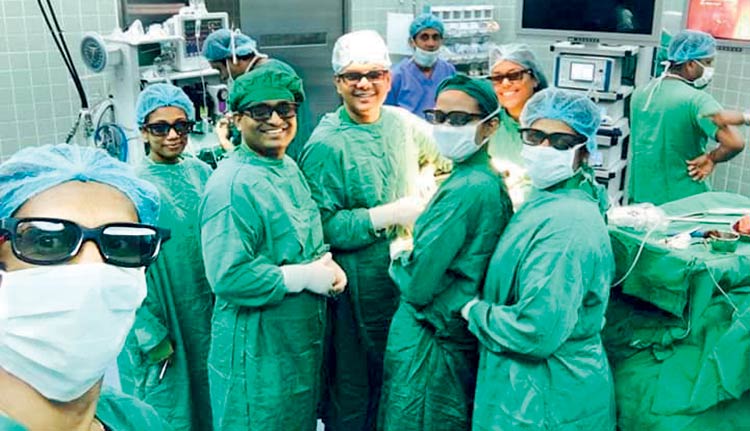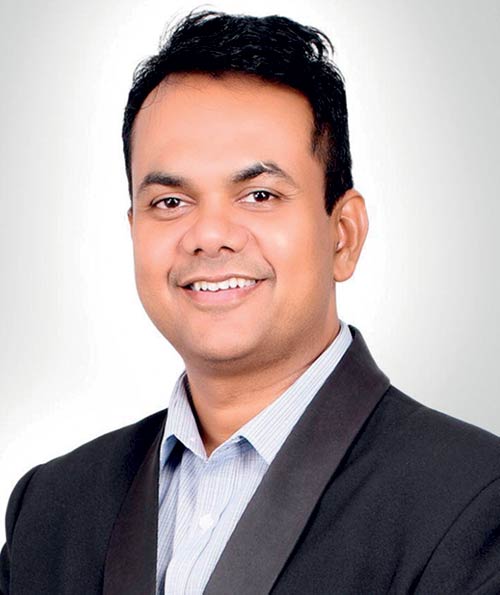Life style
Life changing advancements of organ donation and transplantation in Sri Lanaka

Dr. Niroshan Seneviratne, Consultant Urologist and Transplant Surgeon at Sri Jayewardenepura General Hospital recently delivered the prestigious SAARC oration at the College of Surgeons. He has been at the forefront of advancing kidney transplantation in the country.
Dr. Seneviratne’s pioneering work includes introducing laparoscopic donor nephrectomy and robotic-assisted surgeries to Sri Lanka. As a co-founder of the Organ Donation and Transplant Foundation, he has been instrumental in raising awareness about organ donation and establishing the National Organ Donor Card program.
His leadership extends beyond national borders, serving as the President of the International Community for Belt & Road Cooperation Alliance on Organ Donation & Transplantation. Dr. Seneviratne’s dedication to advancing transplant surgery and urology in Sri Lanka has not only saved countless lives but also positioned the country as an emerging leader in organ transplantation in the region.
 Revolutionizing Kidney Donation and Transplantation: Dr. Niroshan Seneviratne and the transplant team of Sri Jayewardenepura General Hospital lead the Way.
Revolutionizing Kidney Donation and Transplantation: Dr. Niroshan Seneviratne and the transplant team of Sri Jayewardenepura General Hospital lead the Way.
In the realm of organ transplantation, Sri Lanka has made remarkable strides, particularly in kidney transplantation. At the forefront of this medical revolution is the dedicated transplant team at Sri Jayewardenepura General Hospital (SJGH), led by Dr. Niroshan Seneviratne. Their groundbreaking work has become a beacon of hope for those suffering from end-stage renal disease. Today, we delve into the life-changing advancements being made at SJGH, focusing on their pioneering laparoscopic donor nephrectomy program. Successful organ transplantation relies on a dedicated team working with passion, trust, and compassion, united in their mission to save lives.
How serious is the kidney disease problem in Sri Lanka?
Chronic kidney disease (CKD) has become a silent epidemic in Sri Lanka, affecting nearly 150,000 people. Imagine a city the size of Galle, with every resident battling this life-threatening condition. Even more alarming, about 20,000 suffer from a mysterious type called CKD of unknown etiology (CKDu). Each year, approximately 3,000 families lose a loved one to CKD-related complications. These staggering numbers underscore the urgent need for effective treatment options, with kidney transplantation offering the best hope for many.
What options are available for patients with end-stage kidney disease in Sri Lanka?
Patients with end-stage renal disease in Sri Lanka have two main options for renal replacement therapy: dialysis (either hemodialysis or peritoneal dialysis) and kidney transplantation. While both options are available, kidney transplantation is generally considered the best option for long-term survival and quality of life. However, the availability of transplantation is limited by factors such as donor availability and healthcare resources
How has kidney transplantation progressed in Sri Lanka?
Kidney transplantation in Sri Lanka has shown significant progress since its inception. The first kidney transplant was performed in 1985, and by 2022, the country was performing over 200 transplants annually. Sri Jayawardenapura General Hospital has emerged as a leading centre for transplantation, performing both living donor and deceased donor transplants. The country has also adopted advanced techniques such as laparoscopic donor nephrectomy, which has largely replaced open surgery for kidney removal from living donors
What makes Sri Jayewardenepura General Hospital unique in its approach to kidney transplantation?
Our team at SJGH has emerged as a pioneer in kidney transplantation, particularly in the field of laparoscopic donor nephrectomy. This minimally invasive surgical technique for kidney removal from living donors has revolutionized the transplantation process. We are currently the only centre in Sri Lanka routinely performing this advanced procedure, making it a beacon of hope for patients and donors alike.
Can you explain what laparoscopic donor nephrectomy is and why it’s significant?
Imagine being able to give the gift of life with minimal impact on your own. That’s what laparoscopic donor nephrectomy offers. Unlike traditional open surgery, which requires a large incision, this procedure is performed through several small incisions using specialized instruments and a camera. For donors, this means less pain, quicker recovery, and better cosmetic results. It’s a game-changer that’s making more people consider becoming living donors.
Why is it important to emphasize that the donor is not a patient?
A donor is not just a patient; they become an ambassador to society after the surgery, conveying the message: “I feel good about kidney donation; it’s your chance to save lives.”
The donor does not benefit from the surgical incision; the incision is made for the surgeons to remove the kidney. The larger the patient, the larger the incision required. This is why, in laparoscopic surgery, the incision is smaller. Additionally, the availability of 3D technology enhances the precision of the surgery, minimizing tissue damage to the donor.
It’s crucial to remember that kidney donors are everyday heroes making a selfless decision to save someone else’s life. They’re not sick; they’re choosing to give a part of themselves to help another. By using laparoscopic techniques, we ensure that these generous individuals experience minimal disruption to their lives. The reduced recovery time and decreased pain allow donors to return to their normal activities much sooner, making their act of kindness easier on them and their families.

Dr. Niroshan Seneviratne, Consultant Urologist and Transplant Surgeon at Sri Jayewardenepura General Hospital recently delivered the prestigious SAARC oration at the College of Surgeons. He has been at the forefront of advancing kidney transplantation in the country.
What are some challenges facing organ transplantation in Sri Lanka?
Despite progress, organ transplantation in Sri Lanka faces several challenges. These include limited resources for dialysis (with only 107 dialysis centers and 785 dialysis machines nationwide), a shortage of specialized medical professionals (for example, there are only 36 adult nephrologists in the country), low political commitment and funding for organ donation and transplantation programs, and limited public awareness coupled with cultural resistance to organ donation. These factors collectively hinder the expansion of transplantation services and the increase in donor availability
Why is promoting deceased organ donation particularly important for Sri Lanka’s healthcare?
Sri Lanka, like many low and middle-income countries, is heavily dependent on living donors for organ transplantation. However, this creates ethical dilemmas. Deceased donation offers a way to expand the donor pool without these concerns. By focusing on promoting deceased organ donation, Sri Lanka can address its kidney disease crisis more effectively, reduce healthcare costs, improve patient outcomes, and build a more self-sufficient and ethical organ transplantation system.
How is Sri Lanka trying to increase the number of kidney donors?
We are taking several innovative steps to increase kidney donation. These include expanding the living donor pool by carefully evaluating and accepting medically and surgically complex donors, promoting deceased organ donation through public awareness campaigns, and organizing events like National Organ Donor Day to encourage donor registration. In collaboration with the Ministry of Health, we’ve launched a National Organ Donor Card and created a database of registered donors. A website (www.odtfsrilanka.com) has been developed to share inspiring organ donation stories, aiming to educate and inspire potential donors.
What are the future goals for the transplantation program in Sri Lanka?
The futuristic goals in organ donation include the establishment of a simultaneous pancreas-kidney transplant program, which involves transplanting both a kidney and a pancreas together. This approach benefits kidney transplant patients with long-standing diabetes by helping to ensure their new kidney functions for a much longer time. Additionally, there is a goal to commence multi-organ donation, allowing for the possibility of saving eight lives through the donation of the heart, lungs, liver, pancreas, intestines, and kidneys. It is important to recognize that every citizen has the civic right to become an organ donor. The advancement of robotic transplantation is also a key objective, as it promises to enhance the precision and effectiveness of transplant procedures.
Looking ahead, Sri Lanka should aim to further expand its laparoscopic donor nephrectomy program and increase public awareness about both living and deceased kidney donation. The country will need to enhance collaboration among hospitals to share expertise and resources. Advocating for increased government support and funding for transplantation services will be another key objective. Sri Lanka should continue investing in advanced technologies to improve surgical outcomes. Additionally, the country will need to train more surgeons in laparoscopic techniques, which will increase the availability of this minimally invasive procedure.
The story of laparoscopic donor nephrectomy at Sri Jayewardenepura General Hospital by Dr. Niroshan Seneviratne is one of hope, innovation, and dedication. It represents a significant step forward in Sri Lanka’s fight against chronic kidney disease, offering a lifeline to thousands of patients while respecting the well-being of donors. As SJGH continues to lead the way in this field, it not only transforms individual lives but also sets a new standard for kidney transplantation in Sri Lanka and beyond.
Life style
The power of being heard, with psychologist Anita Sharma

Anita Sharma is a psychologist, who approaches the human mind with equal measures of empathy and insight. Known for her calm presence and thoughtful perspectives, she works closely with individuals navigating anxiety, relationship, trauma and the quiet emotional struggles that often go unseen. With experience working with individuals, couples and families, she has built a reputation for helping people navigate emotional challenges with clarity. Compassion and confidence. Anita Sharma stands as a reassuring voice bridging science, sensitivity and cultural understanding.
What inspired you to pursue a career in psychology?
I was inspired to pursue a career in psychology because I have always been curious about how people think and behave, especially when observing the world around us today. With so much happening in society, I often found myself wondering why people responded differently to similar situations and what influenced their choices, emotions, and behaviours. Psychology allows me to explore these questions on a deeper level and understand how factors like the environment, experiences, and social pressures shape a person’s behaviour. This interest motivated me to want to better understand others and eventually use that knowledge to make a positive impact.
How has your journey been as a psychologist? Have you faced unique challenges?
My journey as a woman in this field has required a lot of resilience and self-belief. In a world that is not always kind, there have been moments where certain spaces felt intimidating, but I chose to turn those experiences into strength rather than allow it to limit me. Instead of shrinking myself, I learned to speak up and trust my inner voice. These challenges have shaped my confidence, sharpened my perspective, and reinforced my commitment to the field.
What areas of psychology Do you specialise in and why did you choose them?
I specialize in counselling, focusing on people experiencing depression and anxiety, as well as adolescents, couples, and individuals recovering from surgery. I chose this area because I’m passionate about helping people go through life’s challenges. Supporting adolescents allows me to guide young people through critical stages of growth, counselling couples strengthens relationships, and working with individual’s post-surgery helps them cope emotionally and adjust to major life changes. Overall, this field lets me make a meaningful impact on people’s mental and emotional well-being.
How Do you approach therapy or counselling with clients facing anxiety or depression or trauma?
When working with clients facing anxiety, depression, or trauma, I approach therapy with empathy and patience. I start by creating a safe, non-judgmental space where clients feel heard and understood. I focus on understanding their experiences, thoughts, and feelings, and together we identify coping strategies and goals that are realistic and meaningful for them.
In your opinion, what are the most promising mental health challenges facing women and men?
In my opinion, some of the most pressing mental health challenges today revolve around stress, anxiety, depression, and the pressures of balancing personal and professional life. For women in particular, societal expectations, gender bias, and body image pressures can take a significant toll. Women are often expected to excel at work, manage family responsibilities, maintain social roles, and meet certain standards of weight and beauty appearances. Society frequently makes remarks or judgments about women’s bodies and looks, which lowers their self-esteem. Men also face challenges, like societal pressure to suppress emotions, which can lead to untreated stress or depression. Addressing these challenges requires awareness, supportive environments, and access to mental health resources
What role do you think society can play in reducing stigma around therapy and counselling?
Society plays a crucial role in reducing the stigma around therapy and counselling. By openly talking about mental health, sharing personal experiences, and normalizing seeking support, we can challenge the idea that needing help is a sign of weakness. Media, workplaces, schools, and communities all have a part to play in creating safe, supportive environments where people feel comfortable accessing mental health care. Education and awareness campaigns can also help people understand that therapy isn’t just for crises
Psychology can be emotionally demanding. How do you maintain your own mental health and balance work like pressures?
Psychology can definitely be emotionally demanding and it’s not a field that is suited for everyone. Maintaining my own mental health is a priority. I make a deliberate effort to detach from work at the end of the day, which allows me to process my own emotions and recharge. I also practice regular self-care, such as meditation, listening to music, and spending time with my family. Seeking supervision and peer support helps me gain perspective on challenging cases, ensuring I don’t carry that emotional weight alone
Would you say has been your most rewarding experience as a Psychologist?
Looking back, the most rewarding part of my work in psychology is hearing a client say, ‘I feel so much better after speaking to you.’ In those moments, I’m reminded that simply being present, listening without judgment, and offering support can truly make a difference in someone’s life. Knowing that I’ve helped someone feel lighter, more understood, or more hopeful is incredibly fulfilling and just reinforces why I chose this profession.
Where privacy and social perceptions matter greatly. How do you help individuals feel safe and comfortable seeking psychological support?
In a close-knit society where privacy and social perceptions are deeply valued, some women face pressures from traditional family expectations, including arranged marriages and strict cultural norms. To help them feel safe seeking psychological support, I focus on creating a space built on trust and understanding. For many, it’s the first time they can truly voice their thoughts and emotions, and helping them express themselves is incredibly empowering. By being sensitive to their cultural and societal context, I guide them towards confidence, emotional relief, and the belief that their feelings matter.
Ultimately, I hope this helps people understand the importance of mental wellbeing and seeking support when needed. I believe that at some stage, everyone can benefit from counselling. It’s not just for when you face a problem, seeking support can help you understand yourself better, manage challenges, and grow stronger. Life is always changing and nothing stays the same forever. By taking steps to care for our minds, we can move forward with clarity, courage, and a sense of inner balance, trusting that even difficult moments will pass.
By Zanita Careem ✍️
Life style
New era of wellness

Tranquil and tropical with a rugged beauty and temperate climate, Sri Lanka’s south coast is blessed with a naturally restorative environment. On a rocky outcrop overlooking a secluded cove of golden sand, Anantara Peace Haven Tangalle Resort harnesses the nurturing qualities of its shoreline home to create a sophisticated oasis of soothing and renewal.
Entering its second decade, the resort has announced a fresh expansion of its Anantara Spa menu, enriching an already extensive range of traditional and modern therapies. Anantara Peace Haven Tangalle Resort now hosts the region’s only spa overseen by three resident Ayurveda doctors. Led by Head Ayurvedic DoctorBhagya Wellapilli, these qualified medical officers work alongside accomplished practitioners in immaculate facilities, ensuring authentic and effective experiences, delivered by the safest hands.
In addition to enhancing its wellness team, the resort has also launched the pioneering Ayurvedic beauty sanctuary, Ayu Lavanaya. Named from the Sanskrit words Ayu (life) and Lavanaya (grace), the sanctuary is a modern reimagination of a quintessential Ayurvedic parlour. It aligns physical care with deeper wellbeing through timeless rituals and ancient wisdom. Offered in a new space within the lush, floral environs of Anantara Spa, each meditative treatment at Ayu Lavanaya is formulated for immediate results and long-lasting benefits.
Signature therapies complement a full menu of Ayurvedic manicures, pedicures and eye rituals. The brightening and firming Kumkumadi Royal Facial uses the esteemed Kumkumadi oil to leave skin supple and luminous. The Kesha Revive Hair Ritual pairs a lime and onion extract head massage with warm triphala therapy to relieve tension, fortify roots and boost scalp health. The 120-minute Prana Radiance Ritual detoxifies the senses and rejuvenates vital energies through carefully crafted steps that promote release, balance and renewal. Also available are Abhyanga massages, Pizhichil Kerala-style oil baths, Sweda thermal infusions and more.
Beyond Ayurveda, the award-winning Anantara Spa has also introduced four specially curated aromatic massages, showcasing the sensory potency of the island’s indigenous ingredients. Melt away stress and tension with a Four Hand Massage in which two skilled therapists work in perfect synchronicity to induce profound relaxation. Invoking the natural healing of the ocean, a unique Seashell Massage releases muscles and improves circulation by moving polished shells in graceful, flowing strokes across the body.
Age is no barrier to bliss at Anantara Spa with tailored 30-minute Kids’ Massages for ages four to 12. Using light pressure and natural coconut oils, these gentle treatments support healthy care for growing bodies. For mums-to-be, a 60-minute Pregnancy Massage eases the back, neck, and shoulders, reducing swelling and assisting sleep to boost comfort for mother and baby throughout their shared journey.
Yoga sessions by the sea, a state-of-the-art fitness centre, and nutrient-rich menus augment all therapies and treatments, maximising every benefit and laying the foundation for long-term vitality. For more intensive healing, five-day programmes focus on inner harmony, deep sleep, natural weight management, or holistic detox and rebuilding.
“Since our doors opened, we have been honoured to continue and grow Sri Lanka’s long-lasting tradition of Ayurvedic practices and natural wellness,” said Erik Billgren, General Manager at Anantara Peace Haven Tangalle Resort. “By expanding our spa menu and opening the exciting Ayu Lavanaya sanctuary, we are proud to set a new benchmark in holistic healing for every treasured guest.”
“As a fully-trained Ayurvedic Doctor, I understand the importance of fostering a calm and welcoming environment in which guests can feel completely comfortable,” added Ms Wellapilli, Head Doctor at Anantara Peace Haven Tangalle Resort. “By offering this alongside an extensive menu of expertly delivered rituals, we are excited to redefine the possibilities for soothing stays on Sri Lanka’s beautiful south coast – now, and for many years to come.”
Life style
ITC Ratnadipa awarded prestigious 5-Star classification by Sri Lanka Tourism Development Authority

ITC Ratnadipa has been awarded the coveted 5-Star Classification Certificate by the Sri Lanka Tourism Development Authority (SLTDA), reaffirming its commitment to delivering world-class hospitality and sustainable luxury.
The certificate was formally presented by Mr. Buddhika Hewawasam, Chairman of SLTDA & SLTPB, and accepted by Mr. Keenan McKenzie, Area Manager – Sri Lanka and General Manager of ITC Ratnadipa.
The ceremony was attended by several distinguished officials and industry leaders, including, Board Member, SLTDA; Mrs. Malkanthi Rajapaksha, Director – Standards & Quality Assurance, SLTDA; and Mr. Trevine Gomas, Chairman, Hotels’ Classification Committee. Their presence underscored the significance of this milestone for Sri Lanka’s hospitality sector.
ITC Ratnadipa, a Luxury Collection Hotel, opened its doors in Colombo, Sri Lanka, on April 25, 2024, introducing a new benchmark in responsible luxury and sustainability-driven hospitality. Since its inception, the hotel has been committed to offering exceptional experiences that blend opulence with environmental stewardship.
Addressing the gathering, Mr. Keenan McKenzie stated:
“We are grateful to the Sri Lanka Tourism Development Authority and the Hotels’ Classification Committee for their guidance and trust, and to our partners and stakeholders for their continued support. This milestone strengthens our resolve to elevate Sri Lanka’s hospitality landscape while delivering responsible luxury rooted in sustainability.”
This recognition underscores ITC Ratnadipa’s dedication to excellence, sustainability, and its vision to redefine luxury hospitality in Sri Lanka.
-

 News2 days ago
News2 days agoHealth Minister sends letter of demand for one billion rupees in damages
-

 News5 days ago
News5 days agoLeading the Nation’s Connectivity Recovery Amid Unprecedented Challenges
-

 Features6 days ago
Features6 days agoIt’s all over for Maxi Rozairo
-

 Opinion4 days ago
Opinion4 days agoRemembering Douglas Devananda on New Year’s Day 2026
-

 News6 days ago
News6 days agoDr. Bellana: “I was removed as NHSL Deputy Director for exposing Rs. 900 mn fraud”
-

 News5 days ago
News5 days agoDons on warpath over alleged undue interference in university governance
-

 Features6 days ago
Features6 days agoRebuilding Sri Lanka Through Inclusive Governance
-

 Business5 days ago
Business5 days agoSri Lanka Tourism surpasses historic milestone with record tourist arrivals in 2025














